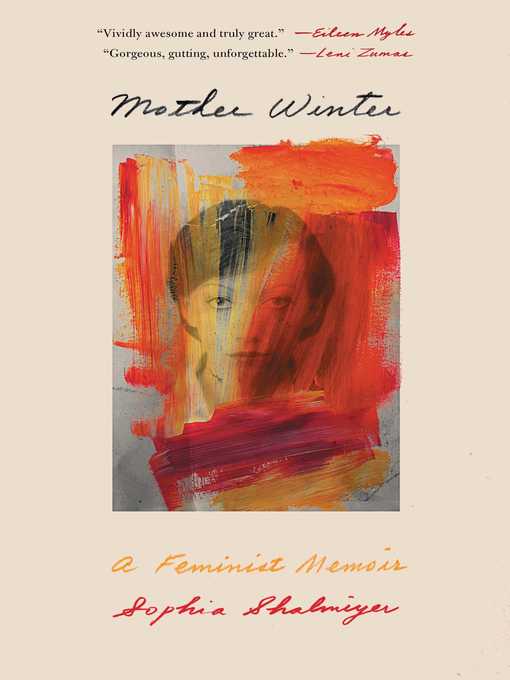
Mother Winter
A Memoir
کتاب های مرتبط
- اطلاعات
- نقد و بررسی
- دیدگاه کاربران
نقد و بررسی

October 8, 2018
In this bold if uneven memoir, Shalmiyev, former nonfiction editor for the Portland Review, writes of being a motherless Russian immigrant, addressing the woman who “left me for the bottle long before my father took me away to America.” Stitching together lyrical essays, fragmented narratives, and critical commentary, she reflects on “Elena. Mother. Mama,” whose absence led her to seek “surrogate mothers for myself: feminists, writers, activists, painters, ballbusters.” Loosely linear with discursive asides, Shalmiyev shares memories of her mother’s drunken promiscuity, her own neglected childhood raised by an enigmatic father, and their emigration from Leningrad to New York in 1990. After her arrival in America at age 11, the narrative becomes more chronological and focused. Shalmiyev describes her college years in Seattle as a sex worker; a fruitless trip to Russia to find Elena; and her subsequent marriage, miscarriage, and role as mother; she intersperses these accounts with musings on art, feminism, Russian history, and the work of Pauline Réage, Anaïs Nin, and Susan Sontag (whose son was raised by his father, “purposefully, unlike my mom, so that she can think clearly and write”). Shalmiyev’s prose can be brilliant, but at times overreaches (“Father never got wintery feet” instead of, simply, cold feet), and the book’s ragged continuity stalls any momentum. This ambitious contemplation on a child’s unreciprocated love for her mother trips over its own story, resulting in an ambiguous, unresolved work. Agent: Jamie Carr, WME.

December 1, 2018
A feminist nonfiction writer's memoir about growing up between two cultures and her search for the mother from whom she was separated as a child.When she was young, Shalmiyev's Azerbaijani father took her alcoholic Russian mother to court. A judge declared Elena--who was so addicted she drank cologne when she didn't have vodka--an unfit mother, estranging her from the family. Her father spirited his daughter away from Leningrad "without a goodbye" to Elena just before the fall of communism and immigrated to the United States. Settling in New York, he married a Ukrainian woman who followed him from Leningrad. The teenage Shalmiyev developed an interest in feminism and female artists such as Sappho, Doris Lessing, and Kathy Acker, among others. Throughout, the author interweaves references to these figures among the impressionistic vignettes that comprise the primary narrative. She also recounts the days in her early 20s when she worked as a peep show stripper among women "caustic with mocking sarcasm, not having any of IT." With Elena never far from her thoughts, she also secretly wrote letters to her mother in English as a "process of mourning my mother [and]...what she did and did not provide me in life." Shalmiyev then returned to Russia to look for Elena only to find that she could not locate her mother anywhere. She continued living aimlessly after that, indulging her penchant for parties and "loud and raucous night[s] that ignore[d] the nuzzling rays of daylight." When she finally married, it was with trepidation--not just for the end of her "party-girl" days, but also for a life of settled domesticity. Shalmiyev knew it was in her just as it was in her mother "to leave [her] children...[and] make them unhappy." Ultimately, though, she chose a path that tested her ability to nurture and forgive. A rich tapestry of autobiography and meditations on feminism, motherhood, art, and culture, this book is as intellectually satisfying as it is artistically profound.A sharply intelligent, lyrically provocative memoir.
COPYRIGHT(2018) Kirkus Reviews, ALL RIGHTS RESERVED.

March 1, 2019
Shalmiyev's first book carries readers to an apartment in Russia, where a little girl lives with an alcoholic mother, to the streets of Italy where a 12-year-old refugee washes car windows, to a peep show in Washington State where a college student works to pay bills, and Portland, OR, where a loving wife writes and cares for her children. During all stages and places of her life, Shalmiyev longs to reunite with her mother, even though a Russian court deemed her mother unfit. At times, the author fears she's becoming like her mother. At other times, she embraces the woman's party girl persona. Indeed, this narrative is of how her mother's alcoholism robbed Shalmiyev of her childhood and impacted her adulthood. VERDICT Despite flashes of brilliance, the writing is uneven with many asides and inordinate word choices. The book is best in its open, raw, reflective, and intimate moments. Readers willing to tackle serious issues of gender roles, displacement, parental neglect, and sexual assault will be ecstatic to discover a writer who unabashedly shares her story.--Beth Dalton, Littleton, CO
Copyright 2019 Library Journal, LLC Used with permission.

January 1, 2019
Artist and writer Shalmiyev's many-faceted memoir is an exploration of heartache and the ways life moves on even after irretrievable changes. We gather through snippets of shared information the texture of her 1980s childhood in the Soviet Union and how, in the custody battle between her parents, she lost her mother when the authorities agreed with her father's contention that he was the better parent. At age 11, Shalmiyev loses her mom again, even more wrenchingly, when she and her father emigrate to the U.S. This is an elegy for lost mothers and lost homes and a consideration of the complexity of national and religious identities and gender roles. A feminist framework underpins a narrative peppered with references to Western art and literature from ancient to modern times and extended by many thoughtful detours. The author's own apparently dueling instincts as a mother and writer are examined with unflinching forthrightness. Interestingly enough, Shalmiyev's description of poet Mary Ruefle's work as poignant and casual also captures the spirit of her own remarkable demonstration of public introspection.(Reprinted with permission of Booklist, copyright 2019, American Library Association.)

























دیدگاه کاربران